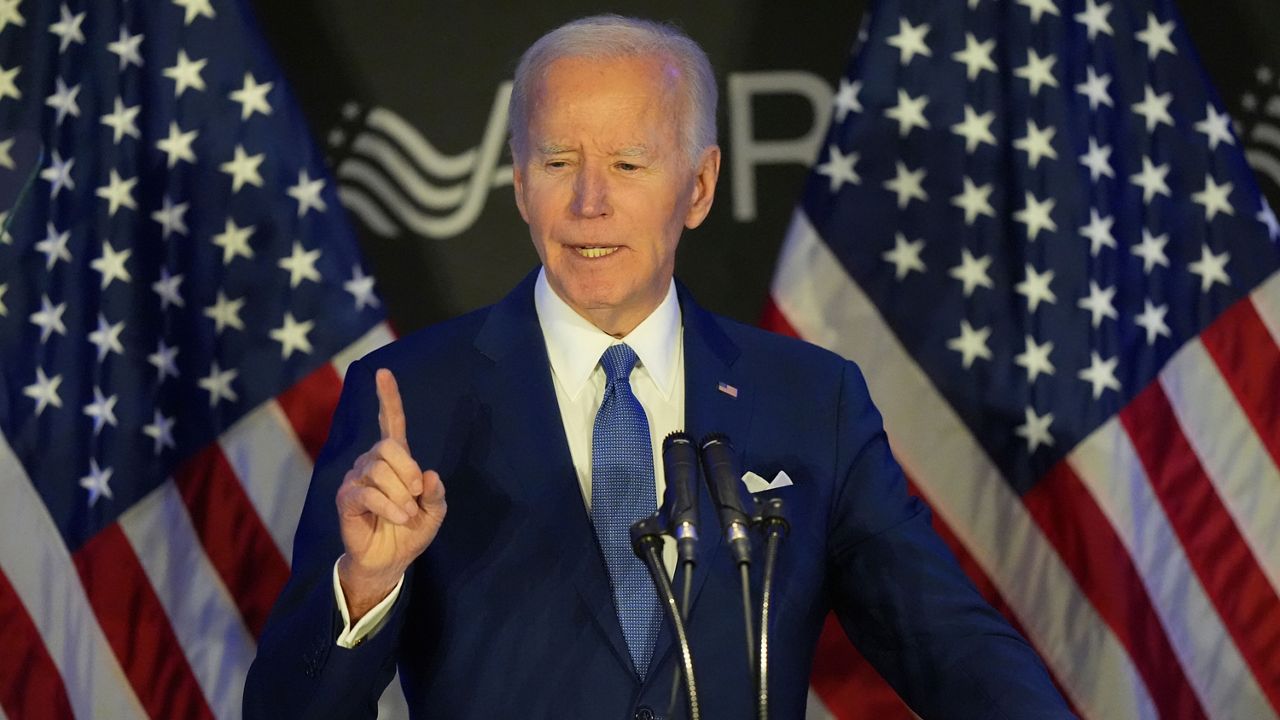Just over a month after President Joe Biden released his budget plan for the next fiscal year, House Speaker Kevin McCarthy told the New York Stock Exchange on Monday he is willing to raise the debt ceiling until May 2024, as he provided an outline for the GOP’s budget proposal.
What You Need To Know
- House Speaker Kevin McCarthy told the New York Stock Exchange on Monday he is willing to raise the debt ceiling until May 2024, as he provided an outline for the GOP’s budget proposal
- McCarthy said the GOP plan would focus on limiting budget growth to 1% each year for the next decade, call back millions in unspent COVID funding allocated throughout the pandemic and grow the economy by cutting dependence on China
- The Republican plan also would put work incentives in place on social programs, all while protecting Social Security and Medicare, McCarthy said
- For the White House, McCarthy’s proposal remains a nonstarter, as the administration has said Congress must raise the debt ceiling without conditions
“In the coming weeks, the House will vote on a bill to lift the debt ceiling into the next year, save taxpayers trillions of dollars, make us less dependent upon China, curb our high inflation, all without touching Social Security and Medicare,” McCarthy promised.
McCarthy said the GOP plan would focus on limiting budget growth to 1% each year for the next decade, call back millions in unspent COVID funding allocated throughout the pandemic, and grow the economy by cutting dependence on China and putting work incentives in place on social programs, all while protecting entitlements.
Though he did not offer many specifics, the speech served as McCarthy’s first real outline of the GOP’s budget agenda, and he called out President Joe Biden a number of times for “misleading the public” and not negotiating with Republicans in good faith. McCarthy said a no-strings debt limit increase would not pass under a Republican-controlled House.
“Seventy-five days ago during our meeting, I told the president clearly, let's find a way to come to an agreement like we have before,” McCarthy said. “If the president agreed to negotiate in good faith, we'd already be done. Unfortunately, I have not heard from the White House since our very first meeting. President Biden has been missing in action and misleading the public.”
Back in March, when Spectrum News sat down with the speaker for an exclusive one-on-one interview, McCarthy promised to “look at every place that we spend money” to see where “we [can] make the dollar go further.” At the time, McCarthy blamed the delay in releasing a GOP budget plan on Biden’s own delayed proposal.
Presidents are supposed to propose a budget by the first Monday in February for the budget year that begins Oct. 1.
“We would have already liked to have this out next month, but the problem is the president delayed us more than a month by not bringing his budget out,” he said at the time. “And the difficulty is – remember the president's been in office for two years, he knew this day so he could be working on this budget. We just took over in January.”
In his speech Monday, McCarthy reiterated some of those talking points.
“We owe it to our children to save money everywhere,” he said. “Our proposal will examine wasteful Washington spending and executive overreach in all forms. Among other items, it will call back tens of billions of dollars in COVID-related money. House Republicans have already passed a bill to end the pandemic officially, and the president just signed it last week. So now it's time for Washington to return to normal. People are tired of politicians who use COVID as an excuse for more extreme inflationary spending. If the money was authorized to fight the pandemic but was not spent during the pandemic, it should not be spent after the pandemic is over.”
Another key point in McCarthy’s proposal would be the reinstatement of work requirements for “able-bodied adults without dependents” on social safety programs such as SNAP food assistance.
“Right now there are more job openings than people who are looking for jobs,” McCarthy said. “You know why? It's in part because the Biden administration weakened work requirements. Incentives matter, and the incentives today are out of whack. It's time to get Americans back to work.”
McCarthy’s promise of a debt ceiling vote in the coming weeks does not come without its challenges. His slim majority means it will be all hands on deck in order to pass the bill in the House. And even if McCarthy can get the votes, the bill likely would not have the votes in the Senate.
Senate Majority Leader Chuck Schumer, D-N.Y., said McCarthy's speech provided no new details on the Republican plan and accused the speaker of putting the country on a track to financial disaster.
“Despite the speaker's stated concerns about costs, nothing would do more to raise costs for American families than an unnecessary Republican default crisis,” McCarthy said at a news conference in Washington. “Speaker McCarthy should know that when you insist on attaching things to the debt ceiling -- something President Trump never did and which Republicans under Trump never did -- you risk a catastrophic default.”
For the White House, McCarthy’s proposal remains a nonstarter. The administration has said Congress must raise the debt ceiling without conditions, as was done under the Trump administration three times, before any discussions can be made about potential spending cuts.
“Our standard hasn't changed,” Bharat Ramamurti, deputy director of the National Economic Council, told Spectrum News. “We've presented our budget that provides detail on both the tax and the spending side. They should do the same.
“If they want to have a big negotiation about the fiscal future of this country, they have an obligation to put out in detail what that is, what is their vision? Not just, ‘We're in favor of maybe some of these tax spending cuts.’ What's their proposal on the tax side How do their numbers add up? Are their tax cuts actually going to increase the deficit more than their spending cuts reduce the deficit? Our analysis suggests so.”
When asked about McCarthy’s accusations that Biden has been “missing in action” and whether the pair has spoken on the budget issue since that Feb. 1 meeting, Ramaurti said he would not “get into private conversations that may be happening” between White House and Hill staff or between the speaker and the president, but he held firm that negotiations would not happen while Republicans “are still threatening to default on our debt.”
“It's perfectly normal and perfectly valid to have conversations about taxing and spending,” Ramaurti said. “We do it every year as part of the normal government budgeting area funding process. We did it last year. What's new this time is that the Republicans are using the possibility of defaulting on our debt as leverage to try to extract painful cuts for middle-class families out of it, even at the same time that many of those same folks voted for $2 trillion worth of tax cuts for the rich and big corporations just a few years ago.”
The Treasury Department has given a timeline of early June for Congress to raise the debt limit or default on its obligations, which could be catastrophic for the global markets and push America into a recession, economists say.








